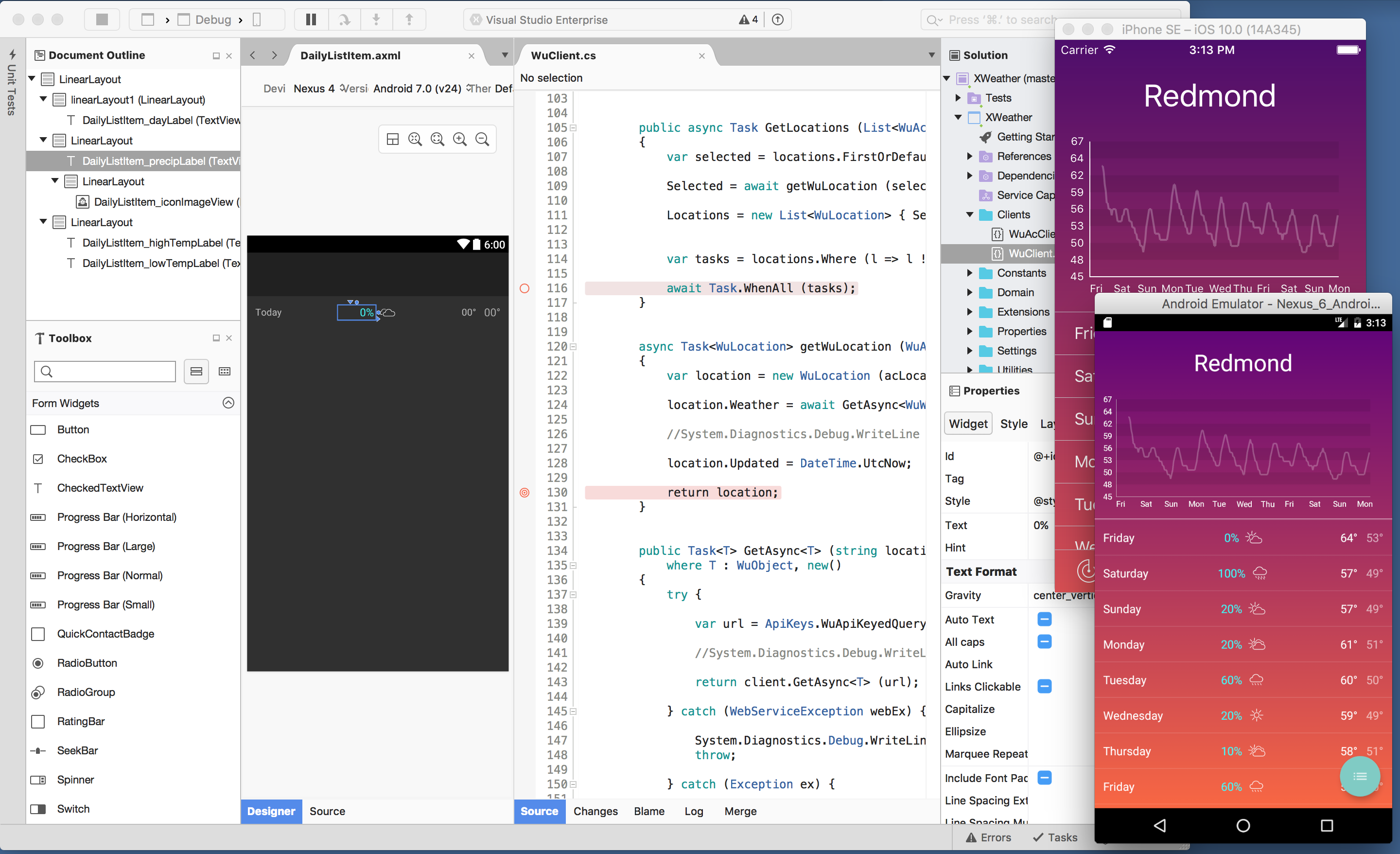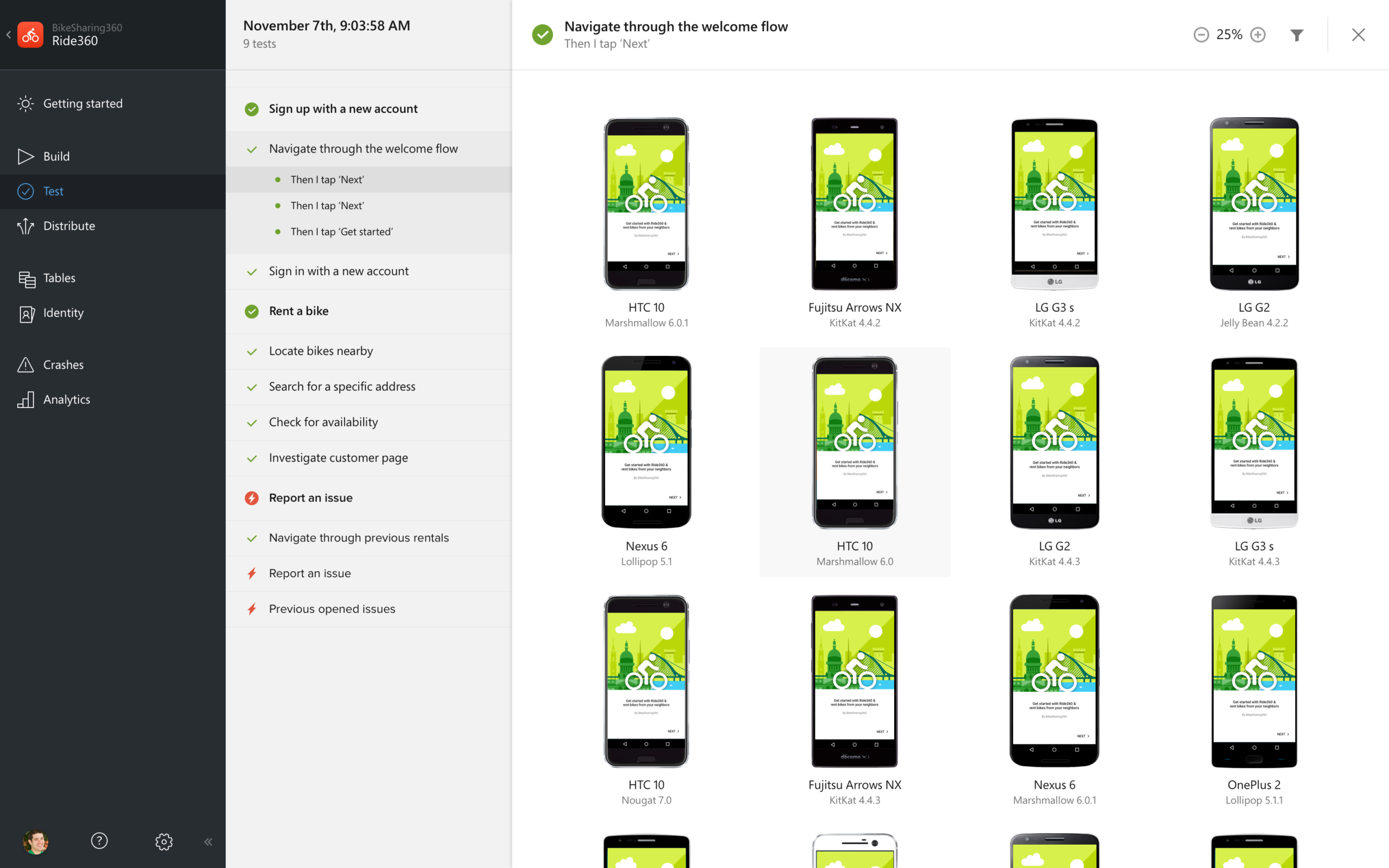We just started a few hours ago, but Microsoft Connect(); 2016 is already a huge success. In addition to our onsite attendees, hundreds of thousands of developers are watching live through Channel 9, and during the keynote, we made major announcements across our Cloud, Data, and Developer tools and services.
Let’s talk a bit more detail about the announcements that mean the most to you, as Xamarin developers.
The Announcements
Visual Studio for Mac (Preview)
We’re excited and proud to introduce Visual Studio for Mac, the latest member of the Visual Studio family. Visual Studio for Mac is a macOS-based IDE focused on building apps for mobile to cloud and will be extremely familiar if you’ve used Xamarin Studio. We’ve taken Xamarin Studio’s robust mobile C# development experience and iOS and Mac support, and, with Visual Studio for Mac, extended it to the cloud and added support for .NET Core.
 Visual Studio for Mac (Preview) includes support for building native Android and iOS apps with C# and F#, just like Xamarin Studio, but also adds ASP.NET Core support. Upcoming releases will improve and add support for more programming languages, including first-class support for CSS, HTML, ASP.NET Razor, JSON and JavaScript editing experiences.
Visual Studio for Mac (Preview) includes support for building native Android and iOS apps with C# and F#, just like Xamarin Studio, but also adds ASP.NET Core support. Upcoming releases will improve and add support for more programming languages, including first-class support for CSS, HTML, ASP.NET Razor, JSON and JavaScript editing experiences.
Xamarin Studio and Visual Studio for Mac can coexist happily on the same machine, so take it for a spin and let us know what you think. For more information, please see our announcement on the Visual Studio Team Blog and the Visual Studio for Mac (Preview) page.
Visual Studio Mobile Center (Preview)
After several months in private preview, we’re thrilled to be able to announce a Preview of Visual Studio Mobile Center to the world. Mobile Center is our new mobile cloud service for mobile developers, a “mission control for mobile apps.” Developers can use Mobile Center to build, test, distribute, and monitor apps from a single, integrated console.
 The current preview includes the following services:
The current preview includes the following services:
- Build: Continuous integration and release management
- Test: Automated testing on real devices
- Crash Reporting: Real-time crash analytics
- Distribution: Deployment to enterprise users or test groups
- Analytics: Business / usage metrics
- Authentication: Easy integration with popular authentication systems
- EasyTables: Create simple cloud-based storage in under 15 minutes
The current Mobile Center preview works with Android and iOS apps built in Objective-C, Swift, Java, Xamarin, and React Native. In future versions, we’ll add more services and support for UWP and Cordova apps.
For more information and request an invitation to join the Preview, please read Nat’s post on the Visual Studio Team Blog.
New Xamarin GA features: Some of you may have tried these in preview over the past few months, and we thank you for your feedback and input. We’re proud to announce that the following features are now generally available and fully-supported:
- The Remote iOS Simulator provides Visual Studio Enterprise subscribers with a remote view to simulated iOS apps, allowing them to stay focused and productive, without having to leave their IDE to work with the app on a Mac.
- Xamarin Profiler allows Visual Studio Enterprise subscribers to find memory leaks, resolve performance bottlenecks, and add polish to their apps before shipping.
- Xamarin Inspector is an interactive tool that enables Visual Studio Enterprise subscribers to attach to their running application and diagnose and prototype changes live. Users can explore the UI and state of their application, alter its state, or even try new APIs on the spot.
- Xamarin Workbooks let you explore C# through rich and interactive contextual experiences for Android, iOS, Mac, WPF, or Console, and get instant live results as you learn these APIs. Great for experimenting, teaching, training, or exploring development in C#.
Appium Support in Xamarin Test Cloud
After a successful private preview, we’re pleased to announce support for Java via the Appium framework in Xamarin Test Cloud. We designed Xamarin Test Cloud to work for any app, in any language, and we want it to work for any developer, too. Our customers have had great success authoring their Xamarin Test Cloud tests in Ruby and the Calabash framework or C# with Xamarin.UITest. But, we know a lot of you may prefer Java, and we want you to be comfortable and able to ship your mobile apps with confidence. With Appium support, Java developers everywhere can now take advantage of real, automated mobile device testing on 400+ configurations to get the productivity and quality benefits of real device testing. You can learn more about this and Test Cloud’s future as part of Visual Studio Mobile Center in our post here.
Want to learn more? Watch the event live, and don’t forget to join us for Day 2, when we’ll dive deeper into the products, including those announced on Day 1, and Day 3, which is a full day of FREE training from Xamarin University and Microsoft Virtual Academy.
